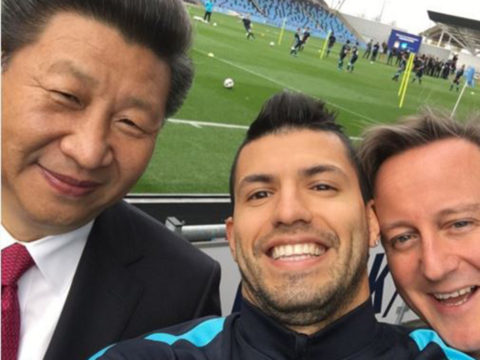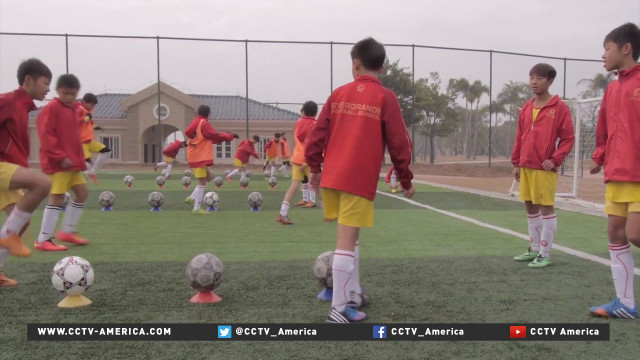It seems like the perfect marriage. Chinese investors have money and national players are ready to play the game. Portuguese teams need their football players and the economic support from investors.
Luis Aguilar is a journalist based in Lisbon, Portugal. His blogs represent solely his views.
Since 2014, Chinese investors have funded nearly 10 Portuguese football clubs. “If it weren´t for the Chinese, nobody was earning money in the lower division of Portugal”, reveals António Pereira, coach of Loures, Portuguese football team owned by an Asian investor.
The Portuguese Football Association has 29 Chinese players registered in senior competitions, but there are many non-registered junior players who have been playing friendly games waiting to turn 18 years- old to be placed on a team.
A good part of those young footballers arrived in Portugal to represent the Oriental Dragon football club. Last year, the club was created to include Chinese players and Portuguese coaches who train them. Oriental Dragon is ran by WSports Seven, another Asian investor that became a major shareholder of the Portuguese lower league football teams, Pinhalnovense and Torreense.
Chinese investor Qi Chen leads the investment project. Since 2006, Chen began working with Portuguese football clubs and arranging the transfers of the Chinese players Yu Dabao and Wang Gang to SL Benfica, one of the major Portuguese football teams and the home of late Eusebio.
He also invested in other European football clubs including – Germany, Belgium and Italy. “It is a country with many skills in training and in the competition for young players. If we compare with other places, in Portugal also there are better laws and regulations to allow players go there and compete”, said Chen, last November, in an interview with Record, Portuguese domestic sports newspaper.
According to Chen, the goal is to train Chinese players in Portugal, so they can return home and improve the quality of their game: “With this project, and all the new players, we are also trying to help China to create a team that allows us to become world champions one day.” The investor describes Oriental Dragon as “a university of football where Chinese players may have a good training in Portugal”. Part of the money that WSports Seven invests in Portugal comes directly from the state -run Chinese Football Association.
The Chinese government wants to make China a football superpower. President of China, Xi Jinping, a fan of the Manchester United, has publically said that seeing China win the World Cup is on his wish list.
The Chinese government is expected to inject $850 billion in sports over the next decade. A big chunk of this money will go to football investments. And they will continue to send their players to other football nations as part of a bigger strategy.
Ledman, another Chinese company, became sponsors of the Second League in Portugal.
Here’s what we know about this deal: Every year, Ledman sends 10 Chinese players, three assistant managers, and money. The Portuguese division needs to add the players to the rotation and this contract is valid thru the season 2018/2019. There’s unconfirmed reports this agreement is worth €4.1 M.
Pedro Proença, president of Portuguese Professional football League (LPFP), did not confirm the amount, instead he said “it’s more than Second League received in the last 10 years”. Proença also said Portuguese teams will not be forced to use the Chinese players: “Clubs have the option to accept them or not.”
However, with the severe financial needs of most clubs in this division, it is likely that many of them will welcome the Asian footballers in exchange for a few thousand euros in their budget. This deal is not without controversy and Joaquim Evangelista, president of Portuguese football Players Union (SJPF), said “it can contribute to ‘steal’ chances to the new generation of Portuguese footballers”. “Lower league teams should privilege the use of portuguese players. How they can evolve if they don´t play?” he said to LUSA, portuguese news agency, after Ledman announced the deal.
Former Portuguese player Figo and ‘super-agent’ Jorge Mendes are helping Chinese football.
China is also investing at home with the government implementing training schools around the country. Some schools have partnered with Luis Figo’s football schools in the country. Luis Figo is a former Portuguese player that sends some of the best Portuguese talent to train younger athletes.
China has also developed training football centers around the country and added football as a mandatory sports class in 20 thousand schools. The government estimates the this figure will double by 2025.
‘Super-agent’ Jorge Mendes, the representative of Cristiano Ronaldo, Radamel Falcao, Angel Di María, among other players, is taking the first bites at the Chinese football market. In 2015, he travelled with José Mourinho, and partnered with the Foyo Culture group.
The Foyo group currently owns 30% of Gestifute, Mendes players’ agency. Mendes believes China’s football is “the most promising market in the world,” but he is not alone on this new conquest. There are also other agents interested in China, such as Pini Zahavi or Mino Raiola.
Portugal is not the only investment spot for the Chinese. Earlier this season, some European teams were helped as well – Slavia Prague, Atletico de Madrid and Espanyol, ABO Den Haag, and Sochaux all are playing thanks to the Chinese investors.
The biggest deal happened at Manchester City, where state-run China Media Capital and CITIC Capital paid $371 million for 13% of City Football Group. President Xi Jinping became one of the owners of Manchester City. The deal celebration included a selfie with David Cameron, the Argentinian player Kun Agüero, and President Xi.

President Xi, the Argentinian player Kun Agüero, and David Cameron.
The rise of Chinese football has just begun in the country. On one side, Portugal, as well as other European nations, appears to support this new venture but on the other hand, others have expressed some concern.
Following the recent moves of several top players to Chinese Super League, Arsenal´s manager Arsène Wenger, said, “the Premier League should be worried with this new wave: We are long enough in this job to know that it’s just a consequence of economic power and they have that.” Like former
Portuguese football superstar Paulo Futre said: “Who will be the next football superstars travelling to Chinese Super League? I don´t know, but I know that, in a few years, all of us in Europe, are going to watch Chinese leagues because the best players of the world will be playing in the country.”
Luis Aguilar is the author of 10 bestseller books related to international football. His last three books are a must have for any football fanatic – Jose Mourinho and Ronaldo’s bio, and most recently, FIFA Nostra, that talks about the biggest corruption scandal of sports history. Since 2004, Aguilar has covered all major sports events and even had the opportunity to interview big names of international soccer. Aguilar has published over 200 articles in Portugal and Brazil. Follow him on Twitter: @LuisAguilar__
 CGTN America
CGTN America

